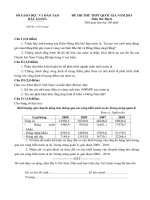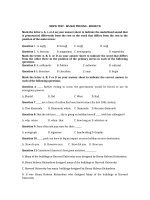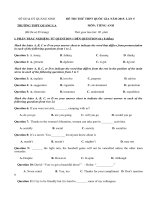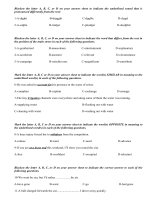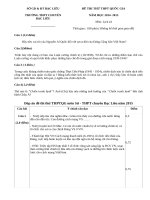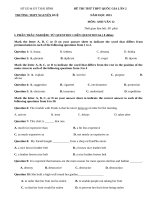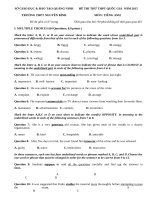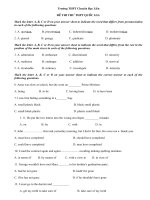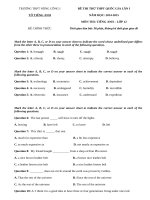- Trang chủ >>
- THPT Quốc Gia >>
- Ngoại Ngữ
Đề thi thử THPTQG môn tiếng anh tỉnh Bắc giang năm 2016
Bạn đang xem bản rút gọn của tài liệu. Xem và tải ngay bản đầy đủ của tài liệu tại đây (181.53 KB, 5 trang )
KÌ THI THỬ THPT QUỐC GIA
Năm học 2015 - 2016
Môn: Tiếng Anh
Thời gian làm bài: 90 phút
Mã đề thi 134
MULTIPLE CHOICE (8 points)
Mark the letter A, B, C or D on your answer sheet to indicate the word(s) SIMILAR in
meaning to the bold word(s) in each of the following questions.
Question 1: Usually the eggs are attached to a tree with a sticky type of glue.
A. broken
B. stuck
C. come
D. remained
Question 2: Besides helping his team to great victories, Messi achieved amazing things for himself.
A. games
B. goals
C. championships
D. wins
Question 3: Beginning December 15th, all mall customers spending at least $50 at any shop are
eligible for free gift wrapping during this holiday season.
A. entitled
B. forbidden
C. responsible
D. required
Read the following passage and mark the letter A, B, C or D on your answer sheet to
indicate the correct answer to each of the questions.
Bees, classified into over 10.000 species, are insects found in almost every part of the world except
the northernmost and southernmost regions. One commonly known species is the honeybee, the only
bee that produces honey and wax. Humans use the wax in making candles, lipsticks, and other
products, and they use the honey as a food. While gathering the nectar and pollen with which they
make honey, bees are simultaneously helping to fertilize the flowers on which they land. Many fruits
and vegetables would not survive if bees did not carry the pollen from blossom to blossom.
Bees live in a structured environment and social structure within a hive, which is a nest with storage
space for the honey. The different types of bees each perform a unique function. The worker bee
carries nectar to the hive in a special stomach called a honey stomach. Other workers make beeswax
and shape it into a honeycomb, which is a waterproof mass of six-sided compartments, or cells. The
queen lays eggs in completed cells. As the workers build more cells, the queen lays more eggs.
All workers, like the queen, are female, but the workers are smaller than the queen. The male
honeybees are called drones; they do no work and cannot sting. They are developed from unfertilized
eggs, and their only job is to impregnate a queen. The queen must be fertilized in order to lay worker
eggs. During the season when less honey is available and the drone is of no further use, the workers
block the drones from eating the honey so that they will starve to death.
Question 4: Which of the following is the best title for this reading?
A. The Many Species of Bees
B. Making Honey
C. The Useless Drone
D. The Honeybee - Its Characteristics and Usefulness
Question 5: The word species in the first sentence is closest in meaning to _______
A. enemies
B. mates
C. killers
D. varieties
Question 6: The word which in the fourth sentence refers to _______
A. fertilizer
B. flowers
C. honey
D. bees
Question 7: According to the passage, a hive is _______
A. a type of honey
B. a storage space
C. a nest
D. a type of bee
Question 8: According to the passage, the drone _______
A. collects less honey than workers.
B. mates with the queen and has no other purpose.
C. can be male or female.
D. comes from eggs fertilized by other drones.
Question 9: The author implies that _______
A. the queen can be a worker.
B. bees are unnecessary in the food chain.
C. drones are never females.
D. drones are completely dispensable.
Trang 1/5 - Mã đề thi 134
Question 10: According to the passage, honey is carried to the hive in a honey stomach by the _____
A. queens
B. workers
C. males
D. drones
Question 11: In what way does the reading imply that bees are useful in nature?
A. They make marvelous creations from wax. B. They create storage spaces.
C. They kill the dangerous drones.
D. They pollinate fruit and vegetable plants.
Question 12: All of the following are characteristic of a honeycomb EXCEPT _______
A. it is made of honey.
B. it is impermeable.
C. it contains hexagonal sections.
D. it is made of wax.
Question 13: The passage implies that bees can be found in each of the following parts of the world
EXCEPT
A. Europe
B. Antarctica
C. Africa
D. China
Mark the letter A, B, C, or D on your answer sheet to indicate the word or phrase that is OPPOSITE
in meaning to the bold part in each of the following questions.
Question 14: Although it’s a long day for us, we feel we are contented with what we do.
A. shocked
B. dissatisfied
C. excited
D. interested
Question 15: I can’t stand people who treat animals cruelly.
A. brutally
B. cleverly
C. gently
D. reasonably
Mark the letter A, B, C, or D on your answer sheet to indicate the word whose bold part differs from
the other three in pronunciation in each of the following questions.
Question 16: A. award
B. against
C. awful
D. ahead
Question 17: A. domestic
B. business
C. tourism
D. opposite
Read the following passage and mark the letter A, B, C or D on your answer sheet to
indicate the correct answer to each of the questions 18 to 27.
The atmosphere that originally surrounded Earth was probably much different from the air we
breathe today. Earth's first atmosphere (some 4.6 billion years ago) was most likely hydrogen and
helium - the two most abundant gasses found in the universe - as well as hydrogen compounds such as
methane and ammonia. Most scientists feel that this early atmosphere escaped into space from the
Earth's hot surface.
A second, more dense atmosphere, however, gradually enveloped the Earth as gasses from molten
rocks within its hot interior escaped through volcanoes and steam vents. We assume that volcanoes
spewed out the same gasses then as they do today: mostly water vapor (about 80 percent), carbon
dioxide (about ten percent), and up to a few percent nitrogen. These same gasses probably created
Earth's second atmosphere.
As millions of years passed, the constant outpouring of gasses from the hot interior - known as
outgassing - provided a rich supply of water vapor, which formed into clouds. Rain fell upon Earth for
many thousands of years, forming the rivers, lakes, and oceans of the world. During this time, large
amounts of carbon dioxide were dissolved in the oceans. Through chemical and biological processes,
much of the carbon dioxide became locked up in carbon sedimentary rocks, such as limestone. With
much of the water vapor already condensed into water and the concentration of carbon dioxide
dwindling, the atmosphere gradually became rich in nitrogen.
It appears that oxygen, the second most abundant gas in today's atmosphere, probably began an
extremely slow increase in concentration as energetic rays from the Sun split water vapor into
hydrogen and oxygen during a process called photo dissociation. The hydrogen, being lighter,
probably rose and escaped into space, while the oxygen remained in the atmosphere.
This slow increase in oxygen may have provided enough of this gas for primitive plants to evolve,
perhaps two to three billion years ago. Or the plants may have evolved in an almost oxygen-free
(anaerobic) environment. At any rate, plant growth greatly enriched our atmosphere with oxygen. The
reason for this enrichment is that plants, in the presence of sunlight, process carbon dioxide and water
to produce oxygen.
Question 18: What is the main idea of the passage?
A. Hot underground gasses created clouds, which formed the Earth's atmosphere.
Trang 2/5 - Mã đề thi 134
B. Plant growth depended on oxygen in the Earth's atmosphere.
C. The atmosphere on Earth has changed over time.
D. The original atmosphere on Earth was unstable.
Question 19: The word "enveloped" is closest in meaning to___________
.
A. surrounded
B. characterized
C. changed
D. escaped
Question 20: The word "they” refers to____________.
A. rocks
B. steam vents
C. gasses
D. volcanoes
Question 21: According to the passage, outgassing eventually led to all of the following EXCEPT
A. the formation of clouds
B. decreases in the level of nitrogen
C. increases in the carbon dioxide content of sedimentary rocks
D. the formation of bodies of water
Question 22: The word "gradually" is closest in meaning to_________.
A. in the end
B. accidentally
C. quickly
D. by degrees
Question 23: The passage suggests that oxygen remained in the atmosphere because_____.
A. it was heavier than hydrogen
B. it was caused by outgassing
C. rays from the sun created equal amounts of hydrogen and oxygen
D. hydrogen became trapped in limestone
Question 24: The author uses the word "Or" to__________.
A. propose a similar idea
B. suggest an alternative
C. criticize the previous suggestion
D. provide unrelated information
Question 25: The phase "At any rate" is closest in meaning to________.
A. although unlikely
B. in addition
C. fortunately
D. regardless
Question 26: The Earth's atmosphere is described in terms of the________.
A. role of volcanoes in its formation
B. order in which changes occurred
C. time it took for the Earth's surface to cool and nitrogen to appear
D. chemical and physical features of gasses
Question 27: Which of the following does the passage mention as necessary for both the production
of oxygen by photo dissociation and the production of oxygen by plants?
A. Water
B. Hydrogen
C. Carbon dioxide
D. Nitrogen
Mark the letter A, B, C, or D on your answer sheet to indicate the word that differs from the other
three in the position of the primary stress in each of the following questions.
Question 28: A. arrive
B. perform
C. attract
D. period
Question 29: A. institution
B. identity
C. preferential
D. engineering
Question 30: A. optimistic
B. celebration
C. independent
D. minority
Mark the letter A, B, C or D on your answer sheet to indicate the correct answer to each of the
following questions.
Question 31: Mr. Thomas does not allow us _____ in his office.
A. smoked
B. to smoke
C. smoke
D. smoking
Question 32: Where did you buy that _____ handbag?
A. funny purple leather
B. funny leather purple
C. leather funny purple
D. purple funny leather
Question 33: It was very good _____ you to give up so much of your time.
A. to
B. for
C. of
D. with
Question 34: He read the Old Man and The Sea, a novel _____ by Ernest Hemingway.
A. that wrote
B. writing
C. which written
D. written
Question 35: _____ over long distances is a fact.
A. That electricity transmitting
B. That electricity
C. That electricity can be transmitted
D. That can be transmitted
Question 36: _____ that Marie was able to retire at the age of 50.
Trang 3/5 - Mã đề thi 134
A. So successful her business was
B. Her business was successful
C. So was her successful business
D. So successful was her business
Question 37: Peter:“I’ve been awarded a scholarship to study in America.”
Kate: “Uh, really? _____!”
A. Take care of yourself
B. Lucky as you are
C. You are always lucky
D. Congratulations
Question 38: She _____ the flowers. If she had, they wouldn’t have died.
A. can’t have watered
B. might not have watered
C. may not have watered
D. shouldn’t have watered
Question 39: “Thank you for taking the time to come here in person.” “_____”
A. I don’t know what time that person comes. B. Do you have time for some gossip?
C. It’s my pleasure.
D. I’d love to come. What time?
Question 40: The Red Cross organizes and leads relief assistance missions after ______, such as
natural disasters, man-made disasters, and epidemics.
A. emergencies
B. emergence
C. emergently
D. emergent
Question 41: Thuy Hien deserved the gold medal with such a(n) _____ performance.
A. oustanding
B. over standing
C. delighted
D. typical
Question 42: We have never experienced such harsh weather. Animals and plants may not _______
the winter
A. survive
B. pass
C. go up
D. live
Question 43: Most doctors and nurses have to work on a _____ once or twice a week at the hospital.
A. solution
B. night shift
C. special dishes
D. household chores
Question 44: The government is expected to take _____ against the level of unemployment.
A. action
B. actively
C. actor
D. activity
Question 45: Quite soon, the world is going to _____ energy resources.
A. get into
B. run out of
C. keep up with
D. come up against
Question 46: In many big cities, people have to ______ up with noise, overcrowding and bad air.
A. catch
B. face
C. put
D. keep
Question 47: Everyone can join our club, ______ age and sex.
A. in case of
B. not mention
C. in place of
D. regardless of
Question 48: _____ hard I tried, I couldn’t help being tempted to play games.
A. Inspite of
B. Despite
C. Although
D. However
Question 49: The Vietnamese _____ hard-working and brave.
A. is
B. being
C. are
D. be
Read the following passage and mark the letter A, B, C, or D on your answer sheet to
indicate the correct word or phrase that best fits each of the numbered blanks.
Football became the game we know today during the reign of Queen Victoria in the nineteenth
century. So many different (50)________ of the game were being played in Britain at that time, that in
1863 the Football Association was formed in order to draw up and agree the (51)________ of the
game.
Throughout the country, new football (52)________ were built and the development of the
railways (53)________ that football teams and their fans could travel to matches. In 1888, the Football
League was (54)________ up with twelve clubs, and football became a national sport, (55)________
to rugby by many people as the more popular game of the two.
Sometimes people played the game in just a field. In one town, Burnley, in the north of
England, the field had river (56)________ along the side of it in which player baths after matches.
People stood on banks (57)________ from earth and it was not until the early 1900s that (58)________
stands were built. The players would have two wooden posts for the goals with tapes across the top
instead of a cross bars and nets were not (59) ________until 1891.
Question 50: A. ways
B. conditions
C. forms
D. methods
Question 51: A. laws
B. lines
C. techniques
D. rules
Question 52: A. grounds
B. lands
C. courses
D. places
Question 53: A. helped
B. said
C. intended
D. meant
Trang 4/5 - Mã đề thi 134
Question 54: A. got
Question 55: A. favoured
Question 56: A. lying
Question 57: A. made
Question 58: A. accurate
Question 59: A. completed
B. set
B. preferred
B. causing
B. consisted
B. right
B. composed
C. made
C. wanted
C. running
C. worked
C. proper
C. invented
D. put
D. liked
D. moving
D. produced
D. correct
D. presented
Mark the letter A, B C or D on your answer sheet to indicate the underlined part that needs
correction in each of the following questions.
Question 60: Bad polluted air can cause illness and even death to many people.
A
B
C
D
Question 61: It announced today that an enquiry would be held into the collapse of a high-rise
A
B
C
apartment block in Kuala Lumpur last week.
D
Question 62:Chemical engineering is based on the principles of physics, chemists, and mathematics.
A
B
C
D
Question 63:A galaxy, where may include billions of stars, is held together by gravitation attraction.
A
B
C
D
Question 64: Neither of the men arresting as terrorists would reveal information about his group.
A
B
C
D
WRITING (2 points)
Part I. Finish each of the following sentences in such a way that it means the same as the sentence
printed before it.
Question 65: It was supposed that the train arrived at 11.30
The train ___________________________________________________.
Question 66: “Don’t forget to prune the rose,” said my aunt.
My aunt reminded ____________________________________________.
Question 67: The boy was punished because he broke the class window.
If the boy ___________________________________________________.
Question 68: They spent more money, they had to work harder.
The more ___________________________________________________.
Question 69: Shirley didn’t begin to read until she was eight.
Not until ____________________________________________________.
Part II. In about 140 words, write a paragraph about your favorite type of movie.
-----------------------------------------------
----------- HẾT ----------
Trang 5/5 - Mã đề thi 134
